BA Primary Education (5-11) with recommendation for QTS (with foundation year) – DIRECT ENTRY
Foundation
- Start date
- –
- Study mode
- –
- Course length
- –
- UCAS Code
- –
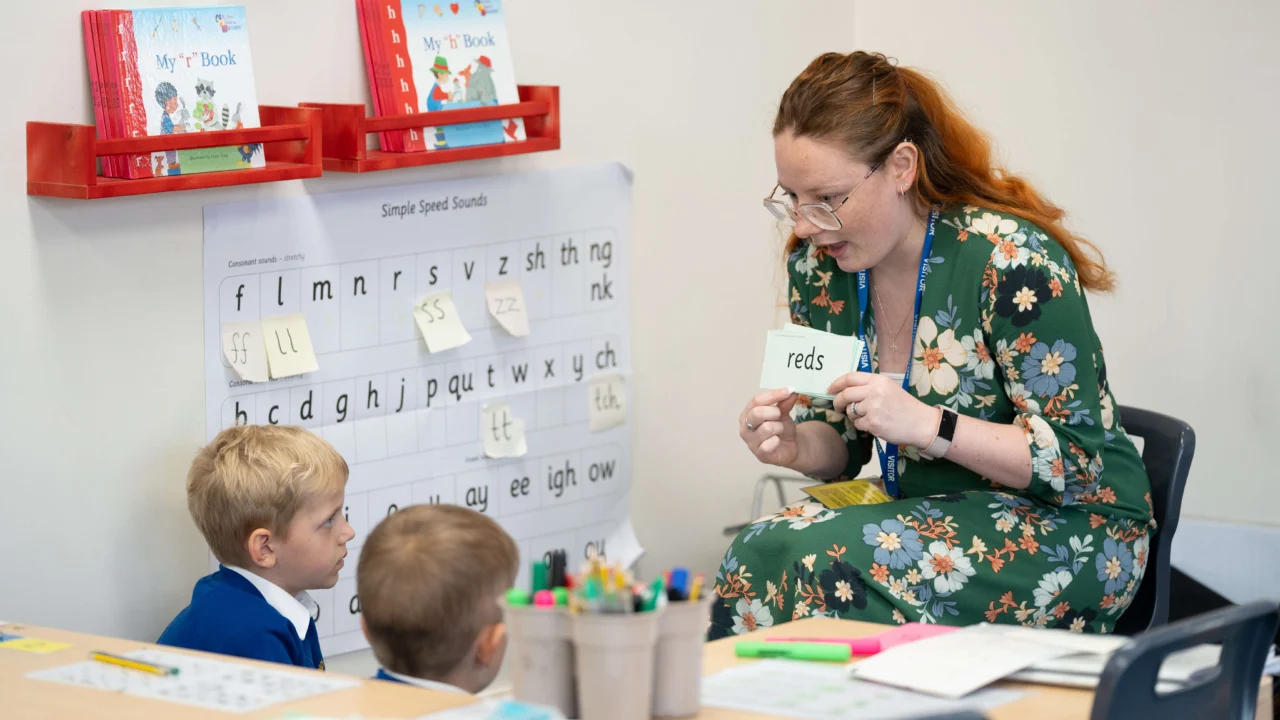
Interested in a different start date?
BA Primary Education (5-11) with recommendation for QTS (with foundation year) – DIRECT ENTRY
The full-time course fee, for UK home students, for September 2025 is: £5,760
For detailed information on course fees for international students, please visit our International Students page, linked below.
Additional Costs
The University will review tuition fees and increase fees in line with any inflationary uplift as determined by the UK Government, if permitted by law or government policy, in subsequent years of your course. It is anticipated that such increases would be linked to RPI (the Retail Price Index excluding mortgage interest payments).
Check out our blog/news/events
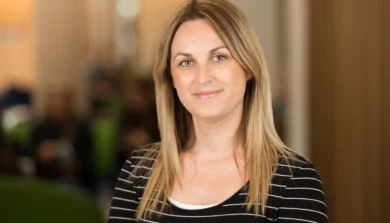
Dr Emma Powell Named Finalist in Birmingham Awards 2025 – Contribution to Education
Dr. Emma Powell SFHEA, Senior Lecturer in Primary ITE at Birmingham Newman University, has been…

Birmingham Newman University Library Recognised as THE Award Finalist for Pioneering AI Support
Forward-thinking work to support the responsible and innovative use of AI in academia has landed…

Birmingham Newman University is delighting in the news that St John Henry Newman, our Patron, will be the newest Doctor of the Catholic Church
Pope Leo made the official announcement – Conferral of the Title of Doctor of the…
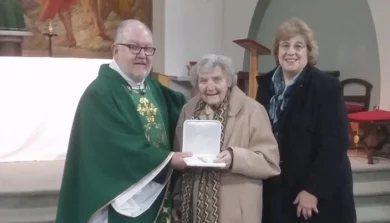
Dr Marie Rowlands Rest In Peace
Long-standing friend and former student of Dr Marie Rowlands, Professor Judith Champ, alongside Fr. Cecil…

Birmingham Newman University Shortlisted for Prestigious Sustainability Award
Birmingham Newman University has been shortlisted for the 2025 Green Gown Awards in the Creating…

Degree group 2
This module, delivered in whole or in part by subject-specific staff, will continue students’ introduction to the content of their chosen degree subject. Students will explore further the disciplinary conventions, core concepts and professional requirements of their degree. The themes under discussion will vary according to the degree the students are studying, but each degree group will enable students to examine the themes and approaches underpinning the chosen area of study. In the tutor group, students will complete a capstone assessment designed and marked by staff in their subject area. This capstone assessment will draw on the skills developed and practices in the core modules.
Degree group 1
This module, delivered in whole or in part by subject-specific staff, will introduce students to the content and staff of their chosen degree subject. Students will explore the disciplinary conventions, core concepts and professional requirements of their degree. The themes under discussion will vary according to the degree the students are studying, but each degree tutor group will enable students to gain familiarity with their chosen area of study and subject staff. In the tutor group, students will complete a capstone assessment designed and marked by staff in their subject area.
Degree group 1
This module, delivered in whole or in part by subject-specific staff, will introduce students to the content and staff of their chosen degree subject. Students will explore the disciplinary conventions, core concepts and professional requirements of their degree. The themes under discussion will vary according to the degree the students are studying, but each degree tutor group will enable students to gain familiarity with their chosen area of study and subject staff. In the tutor group, students will complete a capstone assessment designed and marked by staff in their subject area.
Degree group 1
This module, delivered in whole or in part by subject-specific staff, will introduce students to the content and staff of their chosen degree subject. Students will explore the disciplinary conventions, core concepts and professional requirements of their degree. The themes under discussion will vary according to the degree the students are studying, but each degree tutor group will enable students to gain familiarity with their chosen area of study and subject staff. In the tutor group, students will complete a capstone assessment designed and marked by staff in their subject area.
Degree group 1
This module, delivered in whole or in part by subject-specific staff, will introduce students to the content and staff of their chosen degree subject. Students will explore the disciplinary conventions, core concepts and professional requirements of their degree. The themes under discussion will vary according to the degree the students are studying, but each degree tutor group will enable students to gain familiarity with their chosen area of study and subject staff. In the tutor group, students will complete a capstone assessment designed and marked by staff in their subject area.
Degree group 1
This module, delivered in whole or in part by subject-specific staff, will introduce students to the content and staff of their chosen degree subject. Students will explore the disciplinary conventions, core concepts and professional requirements of their degree. The themes under discussion will vary according to the degree the students are studying, but each degree tutor group will enable students to gain familiarity with their chosen area of study and subject staff. In the tutor group, students will complete a capstone assessment designed and marked by staff in their subject area.
Degree group 1
This module, delivered in whole or in part by subject-specific staff, will introduce students to the content and staff of their chosen degree subject. Students will explore the disciplinary conventions, core concepts and professional requirements of their degree. The themes under discussion will vary according to the degree the students are studying, but each degree tutor group will enable students to gain familiarity with their chosen area of study and subject staff. In the tutor group, students will complete a capstone assessment designed and marked by staff in their subject area.
Degree group 1
This module, delivered in whole or in part by subject-specific staff, will introduce students to the content and staff of their chosen degree subject. Students will explore the disciplinary conventions, core concepts and professional requirements of their degree. The themes under discussion will vary according to the degree the students are studying, but each degree tutor group will enable students to gain familiarity with their chosen area of study and subject staff. In the tutor group, students will complete a capstone assessment designed and marked by staff in their subject area.
Education and society
Students will explore big ideas around higher education, society and identity as they develop their academic skills and confidence. Students will be introduced to theory, examples of which include education theories, theories of learning, race theory, gender theory. Students will be introduced to the context and development of these concepts over time, and from literary and philosophic perspectives. The module will explicitly engage with digital literacy and will include opportunities for students to engage with the online learning environment and develop their digital skills.
Degree group 1
This module, delivered in whole or in part by subject-specific staff, will introduce students to the content and staff of their chosen degree subject. Students will explore the disciplinary conventions, core concepts and professional requirements of their degree. The themes under discussion will vary according to the degree the students are studying, but each degree tutor group will enable students to gain familiarity with their chosen area of study and subject staff. In the tutor group, students will complete a capstone assessment designed and marked by staff in their subject area.
Being human in a digital world
This module is designed to facilitate students’ further critical engagement with the context and concepts to which they were introduced in semester one. Students will exploring ideas about childhood, life and old age in a digital world and have the opportunity for the continued development of core academic skills as well as providing opportunities for students to reflect on their progress. The module will include opportunities for students to engage with the online learning environment and develop information literacy skills.
Degree group 1
This module, delivered in whole or in part by subject-specific staff, will introduce students to the content and staff of their chosen degree subject. Students will explore the disciplinary conventions, core concepts and professional requirements of their degree. The themes under discussion will vary according to the degree the students are studying, but each degree tutor group will enable students to gain familiarity with their chosen area of study and subject staff. In the tutor group, students will complete a capstone assessment designed and marked by staff in their subject area.
Degree group 1
This module, delivered in whole or in part by subject-specific staff, will introduce students to the content and staff of their chosen degree subject. Students will explore the disciplinary conventions, core concepts and professional requirements of their degree. The themes under discussion will vary according to the degree the students are studying, but each degree tutor group will enable students to gain familiarity with their chosen area of study and subject staff. In the tutor group, students will complete a capstone assessment designed and marked by staff in their subject area.
Degree group 2
This module, delivered in whole or in part by subject-specific staff, will continue students’ introduction to the content of their chosen degree subject. Students will explore further the disciplinary conventions, core concepts and professional requirements of their degree. The themes under discussion will vary according to the degree the students are studying, but each degree group will enable students to examine the themes and approaches underpinning the chosen area of study. In the tutor group, students will complete a capstone assessment designed and marked by staff in their subject area. This capstone assessment will draw on the skills developed and practices in the core modules.
Degree group 2
This module, delivered in whole or in part by subject-specific staff, will continue students’ introduction to the content of their chosen degree subject. Students will explore further the disciplinary conventions, core concepts and professional requirements of their degree. The themes under discussion will vary according to the degree the students are studying, but each degree group will enable students to examine the themes and approaches underpinning the chosen area of study. In the tutor group, students will complete a capstone assessment designed and marked by staff in their subject area. This capstone assessment will draw on the skills developed and practices in the core modules.
Degree group 1
This module, delivered in whole or in part by subject-specific staff, will introduce students to the content and staff of their chosen degree subject. Students will explore the disciplinary conventions, core concepts and professional requirements of their degree. The themes under discussion will vary according to the degree the students are studying, but each degree tutor group will enable students to gain familiarity with their chosen area of study and subject staff. In the tutor group, students will complete a capstone assessment designed and marked by staff in their subject area.
Degree group 2
This module, delivered in whole or in part by subject-specific staff, will continue students’ introduction to the content of their chosen degree subject. Students will explore further the disciplinary conventions, core concepts and professional requirements of their degree. The themes under discussion will vary according to the degree the students are studying, but each degree group will enable students to examine the themes and approaches underpinning the chosen area of study. In the tutor group, students will complete a capstone assessment designed and marked by staff in their subject area. This capstone assessment will draw on the skills developed and practices in the core modules.
Degree group 2
This module, delivered in whole or in part by subject-specific staff, will continue students’ introduction to the content of their chosen degree subject. Students will explore further the disciplinary conventions, core concepts and professional requirements of their degree. The themes under discussion will vary according to the degree the students are studying, but each degree group will enable students to examine the themes and approaches underpinning the chosen area of study. In the tutor group, students will complete a capstone assessment designed and marked by staff in their subject area. This capstone assessment will draw on the skills developed and practices in the core modules.
Degree group 1
This module, delivered in whole or in part by subject-specific staff, will introduce students to the content and staff of their chosen degree subject. Students will explore the disciplinary conventions, core concepts and professional requirements of their degree. The themes under discussion will vary according to the degree the students are studying, but each degree tutor group will enable students to gain familiarity with their chosen area of study and subject staff. In the tutor group, students will complete a capstone assessment designed and marked by staff in their subject area.
Degree group 2
This module, delivered in whole or in part by subject-specific staff, will continue students’ introduction to the content of their chosen degree subject. Students will explore further the disciplinary conventions, core concepts and professional requirements of their degree. The themes under discussion will vary according to the degree the students are studying, but each degree group will enable students to examine the themes and approaches underpinning the chosen area of study. In the tutor group, students will complete a capstone assessment designed and marked by staff in their subject area. This capstone assessment will draw on the skills developed and practices in the core modules.
Degree group 2
This module, delivered in whole or in part by subject-specific staff, will continue students’ introduction to the content of their chosen degree subject. Students will explore further the disciplinary conventions, core concepts and professional requirements of their degree. The themes under discussion will vary according to the degree the students are studying, but each degree group will enable students to examine the themes and approaches underpinning the chosen area of study. In the tutor group, students will complete a capstone assessment designed and marked by staff in their subject area. This capstone assessment will draw on the skills developed and practices in the core modules.
Degree group 2
This module, delivered in whole or in part by subject-specific staff, will continue students’ introduction to the content of their chosen degree subject. Students will explore further the disciplinary conventions, core concepts and professional requirements of their degree. The themes under discussion will vary according to the degree the students are studying, but each degree group will enable students to examine the themes and approaches underpinning the chosen area of study. In the tutor group, students will complete a capstone assessment designed and marked by staff in their subject area. This capstone assessment will draw on the skills developed and practices in the core modules.
Degree group 2
This module, delivered in whole or in part by subject-specific staff, will continue students’ introduction to the content of their chosen degree subject. Students will explore further the disciplinary conventions, core concepts and professional requirements of their degree. The themes under discussion will vary according to the degree the students are studying, but each degree group will enable students to examine the themes and approaches underpinning the chosen area of study. In the tutor group, students will complete a capstone assessment designed and marked by staff in their subject area. This capstone assessment will draw on the skills developed and practices in the core modules.
Degree group 2
This module, delivered in whole or in part by subject-specific staff, will continue students’ introduction to the content of their chosen degree subject. Students will explore further the disciplinary conventions, core concepts and professional requirements of their degree. The themes under discussion will vary according to the degree the students are studying, but each degree group will enable students to examine the themes and approaches underpinning the chosen area of study. In the tutor group, students will complete a capstone assessment designed and marked by staff in their subject area. This capstone assessment will draw on the skills developed and practices in the core modules.
Degree group 2
This module, delivered in whole or in part by subject-specific staff, will continue students’ introduction to the content of their chosen degree subject. Students will explore further the disciplinary conventions, core concepts and professional requirements of their degree. The themes under discussion will vary according to the degree the students are studying, but each degree group will enable students to examine the themes and approaches underpinning the chosen area of study. In the tutor group, students will complete a capstone assessment designed and marked by staff in their subject area. This capstone assessment will draw on the skills developed and practices in the core modules.
Degree group 2
This module, delivered in whole or in part by subject-specific staff, will continue students’ introduction to the content of their chosen degree subject. Students will explore further the disciplinary conventions, core concepts and professional requirements of their degree. The themes under discussion will vary according to the degree the students are studying, but each degree group will enable students to examine the themes and approaches underpinning the chosen area of study. In the tutor group, students will complete a capstone assessment designed and marked by staff in their subject area. This capstone assessment will draw on the skills developed and practices in the core modules.
Degree group 2
This module, delivered in whole or in part by subject-specific staff, will continue students’ introduction to the content of their chosen degree subject. Students will explore further the disciplinary conventions, core concepts and professional requirements of their degree. The themes under discussion will vary according to the degree the students are studying, but each degree group will enable students to examine the themes and approaches underpinning the chosen area of study. In the tutor group, students will complete a capstone assessment designed and marked by staff in their subject area. This capstone assessment will draw on the skills developed and practices in the core modules.
Managing the classroom 3-7
The aims for this module are set in the context of the QAA Framework for Higher Education Qualifications and the ITT Core Content Framework (2019). University-based training is provided through the full range of modules undertaken at level 5: these develop the theoretical, subject and pedagogical knowledge needed to underpin effective classroom practice. This module provides the opportunity to identify and apply these in practice during school-based training with the preferred primary age range in a placement setting. Successful completion of all elements of the module are required to progress on to the level 6 professional practice module, Meeting the Professional Standards. In this work-related module, the focus for school-based training is on Managing the Classroom. During an 8-week placement block, students undertake work-related learning in a school setting to experience the wider life of the school and undertake professional tasks and activities that contribute to children’s learning. Students will be expected to reflect upon and critically evaluate their developing knowledge, understanding and skills as they begin to take increasing responsibility for teaching pupils and fulfilling the duties expected of a teacher. They will be required to devise action plans and set targets for continued development and reflect on their own professional development in collaboration with a School Based Tutor from the setting, supported by a Partnership Tutor from the university. Evidence of an appropriate professional standard is necessary for recommendation for Qualified Teacher Status (QTS).
Data analysis within educational research
This module is designed to develop students’ critical knowledge and understanding of the underlying concepts, principles, methods and data analysis techniques in educational research. Students will be guided through both quantitative and qualitative methods for enquiry, in which they will be encouraged to critically evaluate their appropriateness. Engaging in data analysis techniques, students will have the opportunity to interpret research findings and contextualise them within pertinent educational issues. Research ethics and rigour will be evaluated; and students will be encouraged to reflect upon the links between teacher as researcher, pupil outcomes and their own professional development.
Adaptive practice: send framework and specialist support
This module offers students the opportunity to enhance their professional development through exploration of the concepts of inclusion and special educational needs and to gain an appreciation of the complexity of presenting problems. Students will engage with research in the area of inclusion and with the debate surrounding the effectiveness of the inclusion agenda. This will include an in-depth consideration of the issue of pupil disaffection using current research and relevant literature. There will be an informed perspective on current debates in the field of Special Educational Needs and this will provide opportunities for students to engage with their own interests in this area. Additionally, students will consider the range of provision for all children including those with Special Educational Needs and Disabilities and will understand the processes for the diagnosis of, assessment for, and provision provided by multi agencies for pupils with a range of Special Educational Needs. This module aims to develop studentsÊ awareness and understanding of how to develop opportunities for learning and teaching in the classroom where language, particularly multilingualism, could be seen as a barrier but in actual fact can enrich classroom culture. There will be a continued focus on students’ personal development as readers, writers and speakers of languages within different contexts. Students will normally spend time in a SEND setting as part of this module.
Effective teaching and assessment in key stage 1 and 2
In this module you will be provided with opportunities to extend your knowledge and understanding of statutory and non-statutory guidance in relation to the teaching of the English, Mathematics and Science across Key Stage 1 and 2. The three core subjects will be used as a vehicle to explore effective principles and methods of teaching and learning within the primary classroom. You will enhance your understanding of the principles and practices of effective lesson planning across the three subjects and develop your ability to adapt and improve existing lesson plans to provide more enriching learning opportunities for children. You will develop knowledge and understanding of assessment for learning, record keeping, monitoring, tracking, progression, SATS, league tables, using assessment and progression data and analysis and issues and the principles and practices of assessment. The main focus will be upon Key Stage 1 and 2 although links will be made to the early years foundation stage as appropriate.
Beyond the curriculum: religious and social education
This module will examine the role of Religious Education and other curriculum subjects in developing children’s understanding of their wider social environment as part of their preparation to live in society. Through the lens of SMSC (Spiritual, Moral, Social, Cultural) students will be prepared for a better understanding of the expectations from Ofsted to this overarching theme for all curriculum subjects. RE will provide an opportunity to examine world views alongside religious and non-religious perspectives on the nature of spirituality. This will be extended to demonstrate how different subjects within the curriculum make a significant contribution to the development of the whole child through SMSC. Students will examine theoretical frameworks for spiritual, moral, social, and cultural development. The course will also address wider issues including teacher confidence, assessment, and implementation of SMSC across the curriculum. By the end of the module students will have improved their understanding of the holistic development of children, both through and beyond the curriculum. The students will know and understand the significance that Ofsted has placed upon SMSC in deciding the overall effectiveness of a school in the delivery of education.
Managing the classroom 7-11
The aims for this module are set in the context of the QAA Framework for Higher Education Qualifications and the ITT Core Content Framework (2019). University-based training is provided through the full range of modules undertaken at level 5: these develop the theoretical, subject and pedagogical knowledge needed to underpin effective classroom practice. This module provides the opportunity to identify and apply these in practice during school-based training with the preferred primary age range in a placement setting. Successful completion of all elements of the module are required to progress on to the level 6 professional practice module, Meeting the Professional Standards. In this work-related module, the focus for school-based training is on Managing the Classroom. During an 8-week placement block, students undertake work-related learning in a school setting to experience the wider life of the school and undertake professional tasks and activities that contribute to children’s learning. Students will be expected to reflect upon and critically evaluate their developing knowledge, understanding and skills as they begin to take increasing responsibility for teaching pupils and fulfilling the duties expected of a teacher. They will be required to devise action plans and set targets for continued development and reflect on their own professional development in collaboration with a School Based Tutor from the setting, supported by a Partnership Tutor from the university. Evidence of an appropriate professional standard is necessary for recommendation for Qualified Teacher Status (QTS).
Managing the classroom 5-11
The aims for this module are set in the context of the QAA Framework for Higher Education Qualifications and the ITT Core Content Framework (2019). University-based training is provided through the full range of modules undertaken at level 5: these develop the theoretical, subject and pedagogical knowledge needed to underpin effective classroom practice. This module provides the opportunity to identify and apply these in practice during school-based training with the preferred age range in a placement setting. Successful completion of all elements of the module are required to progress on to the level 6 professional practice module, Meeting the Professional Standards. In this work-related module, the focus for school-based training is on Managing the Classroom. During an 8-week placement block, students undertake work-related learning in a school setting to experience the wider life of the school and undertake professional tasks and activities that contribute to children’s learning. Students will be expected to reflect upon and critically evaluate their developing knowledge, understanding and skills as they begin to take increasing responsibility for teaching pupils and fulfilling the duties expected of a teacher. They will be required to devise action plans and set targets for continued development and reflect on their own professional development in collaboration with a School Based Tutor from the setting, supported by a Partnership Tutor from the university. Evidence of an appropriate professional standard is necessary for recommendation for Qualified Teacher Status (QTS).
Managing the classroom 5-11
The aims for this module are set in the context of the QAA Framework for Higher Education Qualifications and the ITT Core Content Framework (2019). University-based training is provided through the full range of modules undertaken at level 5: these develop the theoretical, subject and pedagogical knowledge needed to underpin effective classroom practice. This module provides the opportunity to identify and apply these in practice during school-based training with the preferred age range in a placement setting. Successful completion of all elements of the module are required to progress on to the level 6 professional practice module, Meeting the Professional Standards. In this work-related module, the focus for school-based training is on Managing the Classroom. During an 8-week placement block, students undertake work-related learning in a school setting to experience the wider life of the school and undertake professional tasks and activities that contribute to children’s learning. Students will be expected to reflect upon and critically evaluate their developing knowledge, understanding and skills as they begin to take increasing responsibility for teaching pupils and fulfilling the duties expected of a teacher. They will be required to devise action plans and set targets for continued development and reflect on their own professional development in collaboration with a School Based Tutor from the setting, supported by a Partnership Tutor from the university. Evidence of an appropriate professional standard is necessary for recommendation for Qualified Teacher Status (QTS).
Creative practice across the curriculum
This module will build upon previous knowledge of the foundation subjects as part of the primary National Curriculum. It will provide the opportunity for you to widen your understanding of theory and practice in relation to creative teaching in the foundation subjects through considering the dynamic relationship between teacher identity, emerging pedagogical practice and a school’s ethos. You will be guided to explore the ways in which creative practice can transform pupils’ knowledge, capabilities, and beliefs about learning. Furthermore, the module will allow you to consider the role of adaptive teaching in the foundation subjects as a way of increasing pupil success.
Effective teaching and assessment in the early years and key stage 1
In this module you will be provided with opportunities to extend your knowledge and understanding of statutory and non-statutory guidance in relation to the teaching of the Early Years Foundation Stage and Key Stage 1, including exploring effective practice in terms of transition. You will enhance your understanding of the principles and practices of effective lesson planning across Early Years and English, maths and science ion KS1 and develop your ability to adapt and improve existing lesson plans to provide more enriching learning opportunities for children. Consequently, wider aspects of pedagogy, such as models for outdoor learning, will be used as a vehicle to explore effective principles and methods of teaching and learning. You will develop knowledge and understanding of the principles and practices of assessment, planning for assessment for learning, record keeping, monitoring and becoming familiar with tracking tools that document attainment and progress. Current statutory legislation in terms of testing, such as SATs, phonics screening and league tables will be used to further understanding of the purposes and processes of data analysis. The main focus will be upon Early Years and Key Stage 1, although reference will be made will be made to Key Stage 2 as appropriate.
Courses we think you'll also like
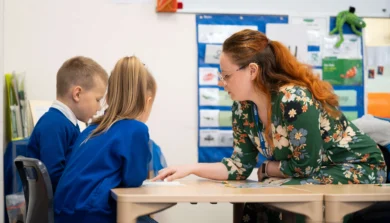
BA Primary Education (3-7) with recommendation for QTS (with Foundation Year) – DIRECT ENTRY
- Start date:
- Various
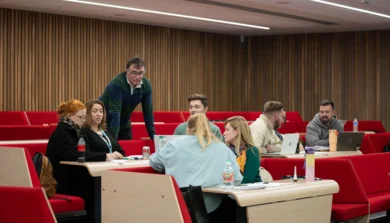
BA Primary Education (3-11) with recommendation for QTS (with foundation year)
- Start date:
- Various

BA (Honours) Secondary Education Religious Education 11-16 with Post 16 enhancement (with recommendation for QTS)
- Start date:
- Various

BA Secondary Education Physical Education 11-16 with Post 16 enhancement (with recommendation for QTS)
- Start date:
- Various
